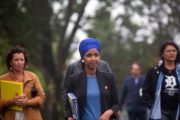
If it’s true that people fear the truth more than they fear lies, then everyone knows why NPR suspended senior business editor Uri Berliner.
Last week, writing for the Free Press, the 25-year veteran gave Americans a look inside the sausage factory. Berliner said the left-wing bias is so out of control that NPR had lost what had been a relatively balanced audience, ideologically speaking. The network now appeals only to white leftist elites.
The network had, he said, “lost America’s trust.”
That suggests that NPR did have America’s trust once upon a time, but that aside, for telling the truth, the network suspended him.
Berliner’s Exposé
Berliner courageously wrote that NPR is little more than a leftist propaganda machine particularly fixated on ruining Donald Trump.
NPR was obsessed with the Trump-Russia Collusion hoax perpetrated by Hillary Clinton’s presidential campaign. It refused to report not only the Hunter Biden laptop story, but also the truth that the Covid-19 virus likely sprung from a lab and did not cross naturally from bats into humans. It promoted the false claims that the lab-leak was the work of right-wing conspiracy theorists.
As well, the network never set the record straight.
“Anti-racism” became an NPR obsession network after the George Floyd Hoax and ensuing nationwide riots. Indeed, “diversity” became the network’s “North Star,” and its zeal for all things racial led to “bizarre stories,” including those that said “The Beatles and bird names are racially problematic.” Stories also justified looting and included “claims that fears about crime are racist.” Other stories implied that “Asian Americans who oppose affirmative action have been manipulated by white conservatives.”
Zero Republicans work at NPR, he wrote, and its audience has dwindled to one that is “overwhelmingly white and progressive, and clustered around coastal cities and college towns.”
There followed an answer from leftist CEO Katherine Maher, who has no experience in the news business and was Wikimedia’s CEO. After Maher’s note to employees went public, past tweets that called Donald Trump a “racist” and justified looting during the Floyd Hoax riots resurfaced in myriad news reports.
EMBED Art from yesterday — Trump is racist tweet
Berliner Suspended
The network struck back and suspended Berliner on Friday, NPR’s David Folkenflik revealed today.
“Tthe public radio network is grappling in other ways with the fallout from Berliner’s essay for the online news site The Free Press,” he wrote:
It angered many of his colleagues, led NPR leaders to announce monthly internal reviews of the network’s coverage, and gave fresh ammunition to conservative and partisan Republican critics of NPR, including former President Donald Trump.
Conservative activist Christopher Rufo is among those now targeting NPR’s new chief executive, Katherine Maher, for messages she posted to social media years before joining the network. Among others, those posts include a 2020 tweet that called Trump racist and another that appeared to minimize rioting during social justice protests that year. Maher took the job at NPR last month — her first at a news organization.
In a statement Monday about the messages she had posted, Maher praised the integrity of NPR’s journalists and underscored the independence of their reporting.
“In America everyone is entitled to free speech as a private citizen,” she said. “What matters is NPR’s work and my commitment as its CEO: public service, editorial independence, and the mission to serve all of the American public. NPR is independent, beholden to no party, and without commercial interests.”
The network claimed that “the CEO is not involved in editorial decisions.”
Maybe, but Berliner told Folkenflik that the posts prove that Maher is the wrong person to run NPR.
And as he wrote in his essay, he also told Folkenflik that NPR’s top brass ignored his repeated attempts to warn them that the network had wandered into the leftist fever swamps.
Berliner’s formal suspension said that “he had failed to secure its approval for outside work for other news outlets, as is required of NPR journalists,” Folkenflik reported:
It called the letter a “final warning,” saying Berliner would be fired if he violated NPR’s policy again. Berliner is a dues-paying member of NPR’s newsroom union but says he is not appealing the punishment.
The Free Press is a site that has become a haven for journalists who believe that mainstream media outlets have become too liberal. In addition to his essay, Berliner appeared in an episode of its podcast Honestly with Bari Weiss.
A few hours after the essay appeared online, NPR chief business editor Pallavi Gogoi reminded Berliner of the requirement that he secure approval before appearing in outside press, according to a copy of the note provided by Berliner.
Amusingly, NPR claimed that Berliner released “proprietary information about audience demographics, which it considers confidential,” Folkenflik reported.
Not surprisingly, the essay and his other public remarks left fellow NPR staffers fuming, but “Morning Edition host Michel Martin told me some colleagues at the network share Berliner’s concerns that coverage is frequently presented through an ideological or idealistic prism that can alienate listeners.”
But Martin also suggested that Berliner was “blowing the place up” and “trashing [his] colleagues.”
Several NPR journalists told me they are no longer willing to work with Berliner as they no longer have confidence that he will keep private their internal musings about stories as they work through coverage.
“Newsrooms run on trust,” NPR political correspondent Danielle Kurtzleben tweeted last week, without mentioning Berliner by name. “If you violate everyone’s trust by going to another outlet and sh–ing on your colleagues (while doing a bad job journalistically, for that matter), I don’t know how you do your job now.”
Full Speed Ahead
The Berliner imbroglio appears to have taught NPR nothing. One of his complaints, again, was that the network is obsessed with diversity.
For instance, “journalists were required to ask everyone we interviewed their race, gender, and ethnicity (among other questions), and had to enter it in a centralized tracking system.” Discussing racial matters was the order of the day.
But “most visible was a burgeoning number of employee resource (or affinity) groups based on identity,” Berliner wrote:
They included MGIPOC (Marginalized Genders and Intersex People of Color mentorship program); Mi Gente (Latinx employees at NPR); NPR Noir (black employees at NPR); Southwest Asians and North Africans at NPR; Ummah (for Muslim-identifying employees); Women, Gender-Expansive, and Transgender People in Technology Throughout Public Media; Khevre (Jewish heritage and culture at NPR); and NPR Pride (LGBTQIA employees at NPR).
All this reflected a broader movement in the culture of people clustering together based on ideology or a characteristic of birth.
Yet instead of refocusing on news, pursuant to Berliner’s revelations, executives will floor the diversity pedal:
Late Monday afternoon, [NPR’s chief news executive Edith] Chapin announced to the newsroom that Executive Editor Eva Rodriguez would lead monthly meetings to review coverage.
“Among the questions we’ll ask of ourselves each month: Did we capture the diversity of this country — racial, ethnic, religious, economic, political geographic, etc — in all of its complexity and in a way that helped listeners and readers recognize themselves and their communities?” Chapin wrote in the memo. “Did we offer coverage that helped them understand — even if just a bit better — those neighbors with whom they share little in common?”
Berliner’s point: NPR would better serve the public if it captured the news and played it straight.
Berliner is no conservative, by the way. As he confessed in his essay:
You know the stereotype of the NPR listener: an EV-driving, Wordle-playing, tote bag–carrying coastal elite. It doesn’t precisely describe me, but it’s not far off. I’m Sarah Lawrence–educated, was raised by a lesbian peace activist mother, I drive a Subaru, and Spotify says my listening habits are most similar to people in Berkeley.
I fit the NPR mold. I’ll cop to that.




